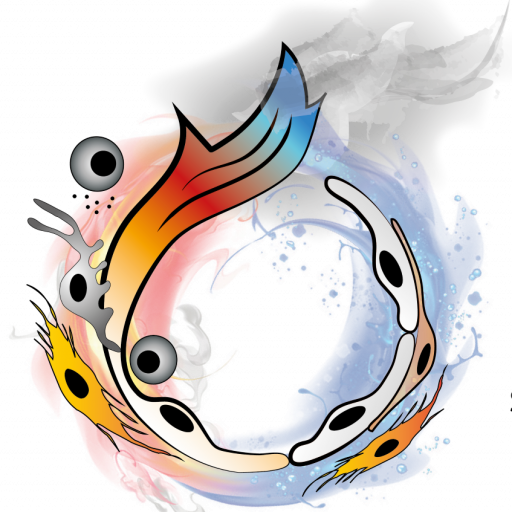Foundation course
A two week (3 hours per day) foundation course that includes lectures and discussions on topics relating to the make-up of the SVC, cardiovascular physiology and pathology, inflammation, the neurovascular unit etc. as well as a basic introduction into good scientific practice, time management, experimental design and randomization.
Cellular heterogeneity in the SVC: endothelial cells, pericytes and fibroblasts
Siragusa, Hefendehl, Luxán
Immune cells in cardiovascular homeostasis and disease
Braun, Cremer
Neurovascular signalling and barrier function in the CNS
Acker-Palmer, Segarra, Hu
Cellular crosstalk in the SVC following cardiac damage
Leuchner, Luxán, Pöling
Vascular injury-induced responses in the SVC, fibroblasts and fibrosis
Wettschureck, Offermanns, Siragusa, Schäfer
Metabolic pathways and epigenetic modifications in the SVC
Potente, Bibli, Hu Fleming
Redox homeostasis and protein quality control in the SVC
Brandes, Dikic, Bibli, Wittig, Münch
Emerging signalling mediators and novel paradigms in damage control
Siragusa, Fleming, Dimmeler
Good scientific practice: experimental design and randomization, time management, data management, ethics
Wettschureck, Wittig, Brandes
Fundamentals for genomic data analyses
Schulz, Abplanalp
Methods workshop
Students are free to choose workshops suitable for their level of expertise and interests from the list below.
Basic courses
(no previous experience required)
Course content: Introduction to microscope adjustment and choice of objectives. Sample fixation, demasking, antibody labelling. Basic use of a confocal microscope using pre-prepared and student prepared samples – troubleshooting
Course content: Hybrid course (seminar & workshop) including hands-on experience in handling human endothelial cells and their acute responses to growth factors. Incudes experiments with live cell imaging (IncuCyte) and EdU incorporation as well as data analysis.
Course content: Hybrid course (seminar & workshop) including hands-on experience in adherence assays (endothelial cells & monocytes) and imaging.
Course content: Theoretical and practical introduction to different assays analyzing leukocyte adhesion to human endothelial cells as well as their transmigration in the transwell system.
Course content: Demonstration of mouse heart digestion, staining protocols for defined subsets, FloJo analysis.
Course content: Theoretical introduction of diverse GPCR signalling and assay formats. Practical session on performing cAMP assay in HEK cells.
Course content: Introduction to flow cytometry and the Fortessa X-20 flow cytometer. Hands on experience in sample preparation, staining and analysis of different types of cells death.
Course content: Theoretical and practical introduction to Metabolomics, including amine group derivatisation, sample extraction, MS run, amine identification and basic stats.
Course content: Theoretical introduction into the basics of mass spectrometry and different proteomic and metabolomic approaches.
Course content: Whole mount retinal explant preparations for the assessment of angiogenic response (filopodia formation) to exogenous stimulus.
Course content: demonstrates a model of organ culture (4 days) to monitor pericyte escape from the retinal vasculature.
Course content: Practical application of expansion microscopy to observe at high-resolution cell-cell contacts with the stroma in health and disease. The technique can be applied to different tissues and adapted to different proteins of interest.
Course content: Introduction to therapeutic strategies for patients with acute coronary syndromes. Demonstration of examinations in the catheter laboratory.
Advanced courses
(years 2-4)
Course content: Tips and tricks for tissue clearing the imaging using the light sheet microscope.
Course content: Basic introduction into Imaris software using student prepared samples.
Course content: theoretical and practical introduction into experimental models of vascular damage.
Course content: Demonstration of brain isolation and preparation and acute slices, staining protocol (vessels, pericytes) for slices. Application of pharmaceutical compound and imaging of brain slice.
Course content: Tissue preparation for 3D analysis of vascular beds and visualization of perivascular cells.
Course content: Mounting techniques (cell culture, tissue samples, en face and whole mount preparations), advanced confocal microscopy and image analysis (Zen, Imaris, Image J).
Course content: Basic introduction to 2 Photon microscopy. Image analysis on prepared samples using Imaris and/or ImageJ.
Course content: Theoretical and practical introduction to lipidomics, including sample extraction, MS run, lipid identification with MS-DIAL and basic stats.
Course content: Basic training in wire myography for small vessels (mesenteric arteries) to assess endothelial function and vascular smooth muscle cell contractility.
Course content: Introduction of different sources and dataset for clinical and phenotype integration (GWAS, scRNA atlases). After introduction, students use their own data for project-specific analyses looking for enrichment of diseases/phenotypes for target molecules or gene signatures. The goal is to tailor the analyses to the project of the participants.
Basics for analysis of epigenome data (ChIP-seq and ATAC-seq) and RNA-seq data, integration of both. Prioritization of transcription factor binding in region of epigenomic activity and integration with gene expression data (combination of theory and hands-on course with intermediate home work).
Course content: Identification of oxidative PTMs following acute damage. Students will gain hands on experience in sample collection and preparation for proteomic (nano-LC/MSMS) analyses of cysteine-oxidative PTMs in endothelial cells/pericytes. In addition, students will be trained to analyse proteomic data and perform statistical analysis (MaxQuant, Perseus software).
Data analysis and bioinformatics
Course content: What is a PCA? What is a classifier and for what do I use it? What is a p-value and why do I need to do multiple testing? How can I compute enrichment for categories and what does this mean? – There will be an exercise sheet as homework.
Course content: Survival tools for R programming and introduction to single cell analysis tools and visualisation. Homework every week to continue learning analysis with R.
